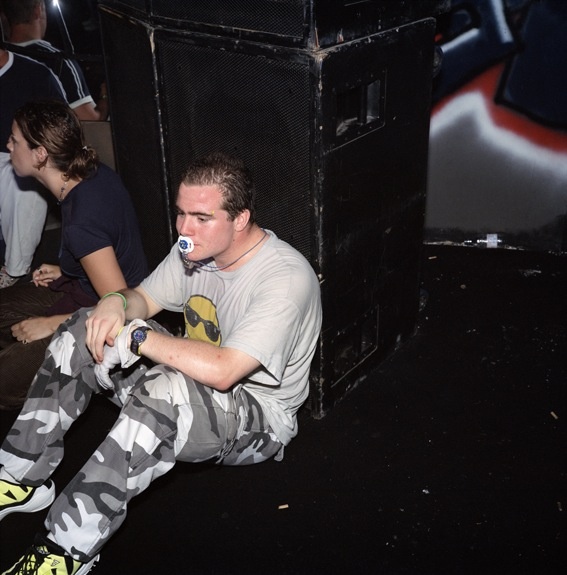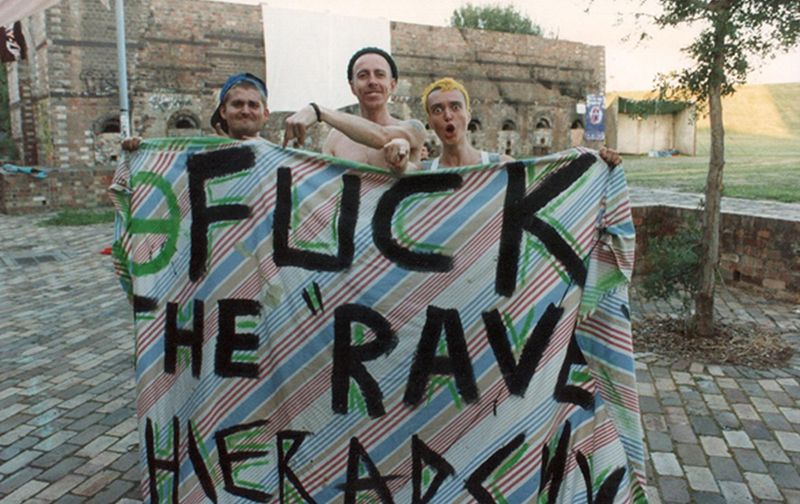Late night dancing, in tiny dives and mega-raves alike, is by its nature ridiculous and indulgent. It’s a parallel world where friendships can live and die and major social schisms can be opened up around differences in kickdrum patterns: as Pinch once said to me of the tiny fluctuations in early dubstep: “It’s funny, sometimes those things that are really close to home but aren’t quite what you want rub you up more than something that’s miles away – maybe the [musical] equivalent of years of Protestants and Catholics killing each other over tiny differences in scripture…” And somewhere in that point of tension between the lust for the new and the desire to repeat and repeat a weekend ritual that works (“I want to feel like this forever!”), comes the endless fracturing that keeps our world so constantly surprising and constantly silly.
Laugh at the macro- and micro-genres that are always splintering off from dance music, though, and nine times out of ten it will come back and bite you in the bum. It’s a lesson I’ve learned repeatedly over the years: every time I’ve been snobbish about any genre or sect within clubland, I’ve been tripped up by realisation of its importance in the continued evolution of the wider culture or – just as likely – found myself out on a dancefloor somewhere, sheepishly realising that it was just straight-up brilliant. And the music scene itself is very self-aware about this, constantly able to bring back anything that’s looked down on and turn it into something that you can’t help but wanting to get in amongst.
There’s a dread word that tends to come up whenever genres or stylistic tics get rehabilitated: IRONY. Nobody wants to be ironic, do they? That’s what – spit – hipsters do right? Pick things that are deliberately naff, and prance around being fake and snide, sniggering at the thing they pretend to like. But on the other hand, when you’re on the dancefloor at 3am, who wants a dry history lesson? The fact is that ravers are by nature piss-takers, and generally aware of the ridiculousness of what they do – again dance culture’s peculiar self-awareness – so, yes, there is irony in revivalism, because quite often it’s just funny.
The “irony question” is irrelevant: ultimately in that crucial party context dance music either works or it doesn’t.
What got me thinking about this was Hudson Mohawke, Rustie, Jackmaster, and a couple of the LuckyMe team throwing a trance and hardcore session with guests Cloudo and Mayhem, done early evening with no advance tickets to feel like the Glasgow underage raves they all came up through. They’d long been planning it, to quote LuckyMe’s Dom Flannagan, “because it’d be funny” – and from the Bonkers-style flyer (designed by LuckyMe’s Eclair Fifi) on down, it is spectacularly funny… but obviously utterly sincere. And no surprise either: how much lovingly delivered tribute to trance and hardcore is there in Rustie and HudMo’s catalogue already, after all?
Likewise, look at PC Music. There’s an awful lot of flapping about whether their referencing of j-pop, trance, hard house, happy hardcore, R&B and so on is done out of love or satirical intent – but as I discovered in Texas, “the jarring stylistic leaps, the archness, the refusal to delineate what’s pisstake and what’s not: this is jumbled, scrappy Britain all over… an expression of something deep and weird in the collective unconscious.” It’s the expression of people who’ve grown up with populist but hyper-intense electronic music as part of the cultural landscape, and therefore as part of them. And when you’re in the thick of things, witnessing them rock a party, you know that the “irony question” is irrelevant – just like whether someone is “outsider” or not is irrelevant – because ultimately in that crucial context dance music either works or it doesn’t, and increasingly PC music are showing that for them it does.
So let’s hear it for all the dance forms that I and other people looked down on or looked away from. For Liberator-style “acid tekno” which BR contributor Ian McQuaid convincingly defended earlier this year. For donk: I along with the rest of the south had smirked along with Vice post “Put a Donk on It”, right up to the moment that DJ Haus brought Blackout Crew down to London and I witnessed what a brilliantly honed operation they were and what sense they made in the club. For makina, the gritty Tyneside rave-with-MCs microgenre so locale-specific that it doesn’t even reach Sunderland. For blissful jazzy drum’n’bass and broken beat, so often written out of underground history in favour of a narrative that limits London’s pirate radio culture to expressions of “mechanismo” (©Kodwo Eshun), or simply sneered at as “coffee table”.
It’s the voracious need of DJs to drop something that will surprise and delight by triggering unexpected synapses.
For pop-trance, which acts like Cornelia, Strict Face and DJ Paypal and friends, as well as the PC Music crew, remind us has its melodies indelibly woven into generations’ synapses. For brostep: however much you loathe it and laugh at the excesses of 2011, trust me it’s going to come back in forms you never imagined one day. For hard house which gave us some of the biggest bangers of the nineties. For breaks, which is capable of a lot more than you probably think (and, contra one contrarian DJ’s view that it’s “middle-class garage” has had the likes of Brockie, Zinc, Slimzee, Shut Up And Dance and the Ragga Twins come through it and was instrumental in the birth of grime). For progressive house… well, OK, that is 99.9% fucking monstrous, but even this bloated horror had genuine magic moments which you can still surprise people with in a set today.
And that’s the point here: this isn’t some hey-wow-everything’s-great screed, this is simply how dance music works. It has always been about the Darwinian force of the crowd, about what works in the moments, and the voracious need of DJs to drop something that will surprise and delight by triggering unexpected synapses, including those in the memory banks. So yes, dance music is full of absolute irredeemable tripe, of course it is, and there are a million tunes out there that deserve their obscurity or derision – but if there’s even so much as a glimmer of something great within a scene or sound, rest assured that eventually some bright spark will find it, amplify it and prove the nay-sayers wrong. So be careful what you sneer at, unless you like having your bum bitten.

